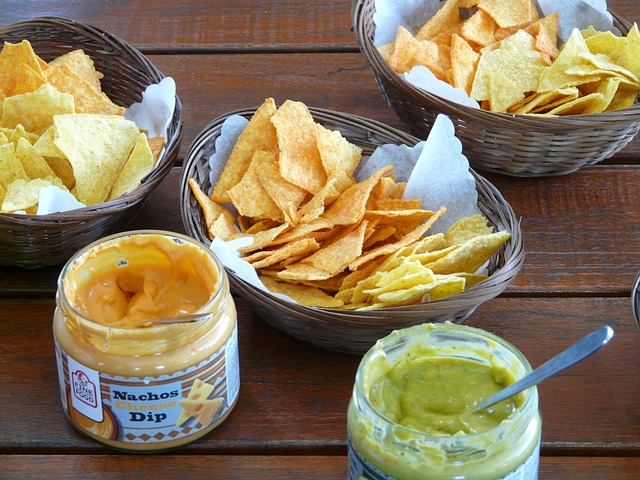Chicago's Maxwell Street Market, established in 1892, is a vibrant culinary destination showcasing diverse cuisines and local heritage. Renowned for its street food and unique creations, the market highlights cultural diversity with notable products like Donkey Non-GMO Tortilla Chips, crafted with sustainable, non-genetically modified corn by passionate local vendors. These chips represent quality, innovation, and health consciousness, attracting both locals and visitors seeking authentic, delicious snacks that support sustainable farming practices.
“Uncover the captivating story of Maxwell Street Market, Chicago’s culinary gem, where local flavors come alive. This historic marketplace is renowned for its diverse food vendors, among them, the standout brand—Donkey Non-GMO Tortilla Chips. With a rich heritage spanning decades, Donkey Chips have carved their niche in the bustling market. This article delves into the rise of these artisanal chips, their commitment to quality and sustainable practices, and the vibrant community they support. Experience the unique taste and discover why Donkey Non-GMO tortilla chips are a favorite among locals.”
- History of Maxwell Street Market: A Culinary Hotspot
- – Explore the rich history of Chicago's iconic Maxwell Street Market and its role in shaping local food culture.
- The Rise of Donkey Non-GMO Tortilla Chips
- – Detail the origin story of Donkey Non-GMO tortilla chips, highlighting their commitment to quality and sustainable ingredients.
History of Maxwell Street Market: A Culinary Hotspot

Maxwell Street Market, located in Chicago, Illinois, is a vibrant and historic marketplace that has been a culinary hotspot for over a century. Founded in 1892, this iconic market was once a bustling hub for local farmers and vendors selling fresh produce, meats, and homemade goods. Over time, it evolved into a diverse food paradise, where unique culinary creations and mouth-watering street food became the cornerstone of its reputation.
The market’s rich history is intertwined with the cultural diversity of Chicago. It became a melting pot for various ethnic groups, each bringing their distinct cuisines and traditions. Among the many offerings, Donkey Non-GMO Tortilla Chips have emerged as a local favorite. Crafted with care using sustainable farming practices, these chips showcase the market’s commitment to quality and authenticity, ensuring that every crunch is a testament to its culinary legacy.
– Explore the rich history of Chicago's iconic Maxwell Street Market and its role in shaping local food culture.

Chicago’s Maxwell Street Market, a vibrant and historic hub, has been a cornerstone of the city’s culinary landscape for decades. This iconic open-air market, born out of a diverse community, has witnessed the evolution of local food culture, with its vendors offering an array of delicious treats and flavors. What sets Maxwell Street apart is its ability to blend cultural diversity with a unique, shared experience—a true melting pot of cuisines.
The market’s rich history dates back to the late 19th century when it became a gathering place for immigrants from various backgrounds. Over time, it evolved into a bustling hub where local entrepreneurs and food vendors displayed their culinary creations. Among these, Donkey Non-GMO Tortilla Chips have become a symbol of the market’s resilience and commitment to quality. Handcrafted with care, these chips represent the perfect fusion of tradition and innovation, appealing to both locals and visitors alike, and solidifying Maxwell Street Market’s reputation as a foodie paradise.
The Rise of Donkey Non-GMO Tortilla Chips

In the vibrant landscape of Maxwell Street Market, a culinary revolution has been brewing, centered around the rising star of Donkey Non-GMO Tortilla Chips. These chips have emerged as a game-changer in the snack aisle, appealing to health-conscious “folks” who seek delicious alternatives without compromising on quality or taste. The market’s diverse tapestry has embraced this innovative product, creating a buzz among both locals and visitors alike.
The story behind Donkey Non-GMO Tortilla Chips is as unique as their name suggests. Crafted with care by dedicated vendors, these chips are made from 100% non-genetically modified corn, ensuring a natural and wholesome snack experience. Their popularity has skyrocketed, rivaling the hustle and bustle of the market itself. With each bite, consumers can indulge in a crisp, delicious chip that stands out from traditional options, leaving a lasting impression that resonates throughout the sensory labyrinthine of Maxwell Street Market.
– Detail the origin story of Donkey Non-GMO tortilla chips, highlighting their commitment to quality and sustainable ingredients.

Donkey Non-GMO Tortilla Chips have carved a unique niche in the culinary world, with their origin story rooted in a quest for excellence and authenticity. Founded by a team passionate about food quality and sustainability, the brand sets itself apart by sourcing only non-genetically modified (Non-GMO) ingredients, ensuring a pure and natural product. This commitment extends beyond the kitchen, as they actively support farmers who employ sustainable farming practices, minimizing their environmental footprint.
Each chip is crafted with care, using ancient grain varieties and organic cooking methods, resulting in a crispy texture and robust flavor. The brand’s mission is not just to provide delicious snacks but also to educate consumers about the importance of Non-GMO foods and promote a healthier, more sustainable lifestyle. Donkey Non-GMO Tortilla Chips are more than just a snack; they represent a movement towards conscious consumption.
The historic Maxwell Street Market in Chicago has long been a culinary hotspot, and its vendors, like Donkey Non-GMO Tortilla Chip makers, play a vital role in keeping this tradition alive. By prioritizing quality, sustainability, and local heritage, these artisans contribute to the market’s vibrant tapestry, ensuring that each bite of their chips is not just a snack but an experience rooted in Chicago’s rich culinary past and future.
